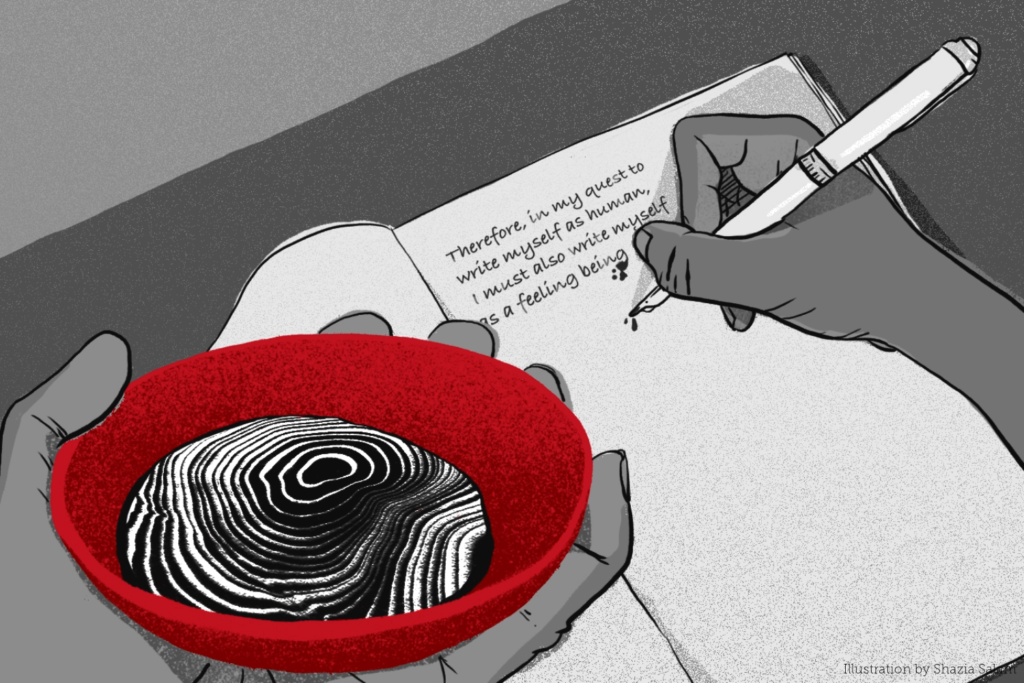Throughout my time as a university student, it became abundantly clear that emotions were to be left out of theorising and research. As students of the humanities, we were required to read and observe to come up with and analyse theories. However, in my fourth year at university, I did an African Feminist Theory course in English Literature and my eyes were opened wide to how I could use my experience to theorise. I bore witness to black women writers such as Oyèrónkẹ́ Oyěwùmí, Obioma Nnaemeka, Yvette Abrahams, Barbara Boswell and Zoe Wiccomb writing in a way that made so much sense to me. The readings were easy to grasp, and even enjoyable to read, all the while theorising as they went on. These writers showed me the type of writer that I aspired to be.
Many of the papers that I read, written by African men who spoke of decolonisation (a large topic of discussion in the field of African Studies) wrote in a way that seemed exactly to the likening of Western scholars. But when I read the writings of African women scholars, it was inquisitive, not authoritative; emotive, not factual; simple and understandable, not complicated. And I thought to myself, “That’s decolonial literature” – not just speaking of decolonisation but actually doing it – writing in a way that does not bend to Western scholarship, writing in a way that makes sense for the writer and those around them.
I later began working on my Honours Research Paper, titled, ‘Stories Om’ie Vuur: Recovering Memory and Rupturing the Present’ (2021). This paper focused on my heritage and stories about my paternal lineage. My paper was largely auto-ethnographic and I decided to focus on my own experience, my father’s experience and my paternal grandmother’s experience. Yes, I theorised and referenced several sources, but the core of my work was based on what was told to me and how I experienced doing my research and writing my paper.
During my research process, I interviewed my grandmother, and I saw just how little she was able to express her emotions throughout her life. One of my interview questions focused on the death of one of her eleven children (my father’s older brother, Sammy). I asked about how that impacted her and how she was able to remain committed to her responsibilities to the rest of her children and her husband while dealing with his death. She told me that she simply had to continue with life and didn’t think much of it.
In my interpretation of her brief answer (she was not a woman of many words), I gathered that there was in fact little space to grieve. My aunt later told me that she remembered the day that her brother died – she remembered how my grandmother heard the news and began cleaning the house excessively. It seemed to me that my grandmother unconsciously used her responsibilities to cope with the grief of losing a child. I was saddened by how little space there was for her to lament over her loss. However, I was also intrigued by the ways in which she was still able to find her own way of coping. This story opened my eyes to how feeling and expressing one’s emotions can function as an act of resistance.
Now, I choose to always feel and express my feelings through my writing. Not only is this my right as a writer and a human being but, it is also my duty as the descendant of a long line of women who felt that there was no space or time for them to express their emotions. Thus, I choose to reclaim that space. I choose to back up opinions and theories with lived experience. To me, this is the real work of decolonisation in academia – not merely writing big, fancy words about liberation theories, as if to prove that we belong in Western academic spaces.
While I may write in English and within Western-centric institutions, I am committed to continue to write for me and all those who look like and relate to me. I write for those who never had the time to write and feel. When I write as a scholar, I must also write as a human. A human being with emotions, and experiences, and knowledge beyond what I have read. I cannot ignore my humanity in my advocacy for decolonisation – in fact, it must be embedded in the very fabric of my writing. Therefore, in my quest to write myself as human, I must also write myself as a feeling being.
__
A list of African feminist writers that Zoë recommends:
- Oyèrónkẹ́ Oyěwùmí
- Obioma Nnaemeka
- Yvette Abrahams
- Barbara Boswell
- Zoe Wiccomb
- Pumla Gqola
- Gabeba Baderoon
- Mmatshilo Motsei


